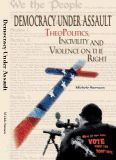
 |
Democracy Under Assault
Michele Swenson
|
|---|
Rev. D. James Kennedy of Coral Ridge Ministires published in 1997 the booklet Out of Order: How Courts Steal the Rights of People. It ispresents various plans ofassault on the independent judiciary by such conservative luminaries as Judges Robert Bork and Antonin Scalia, Chuck Colson, Gary Bauer, James Dobson and Professor Russell Hittinger. All cite evidence of judicial "despotism" that disregards religiously-defined morality. They frankly advocate declaring null and void all man-made laws that violate their fundamentalist political vision of moral law, and if need be, initiating civil disobedience or revolution.
The themes of D. James Kennedy’s contributors provide the subtext of the war against the judiciary. A convoluted read of anti-discrimination laws holds that laws protecting homosexuals punish and discriminate against religious opponents of homosexuality - the discriminators become self-defined victims. In fact, Colorado Amendment 2 permitting discrimination against gays was said to be necessary "to protect from punishment those with moral objections" to homosexuality— protecting discrimination against disfavored groups. Furthermore, they protested, overturn of Amendment 2 branded religious opponents bigots. In this light, too, Justice Antonin Scalia’s distorted interpretation of minority rights can be understood: "You protect minorities only because the majority determines that there are certain minority positions that deserve protection."
Chuck Colson calls fellow conservatives "frustrated religious patriots," abandoned by courts that have prohibited those with strong religious convictions from forcing "their views, their religious convictions, or their philosophies on all the other members of a democratic society." Predicting that a "showdown between church and state" may be inevitable, Colson contends that the American judiciary has compromised the moral legitimacy of the political order and the allegiance of evangelical Christians.
Law Professor Russell Hittinger affirmed the duty to disobey the "illegitimate judicial regime." He blamed an "ethic of modernity" spread through diffusion of the sciences and the arts for decisions like Roe that make "the political regime unlivable for serious Christians and Jews." Citizens of "rightly-formed conscience" have been thrown into "moral crisis" by the courts’ invalidation of legislation informed by traditional religious morality. In Hittinger’s estimation, it may become necessary to precipitate a constitutional crisis to bypass illegitimate government, should they fail to achieve political domination through civil disobedience.
In Out of Order, Judge Robert Bork, too, proposed draconian measures against the "band of outlaws" in the courts— a constitutional amendment to reverse court decisions by a simple majority vote of the Senate and House, and another to eliminate constitutional review of laws by the judiciary. He denounced protections by the "judicial oligarchy" for homosexual or women’s rights as "fads of the cultural elite."
The 1980s founding of the Federalist Society, mentored by Bork and Scalia, was regarded an antidote to liberal judicial activism. In the end, impeachment of judges was deemed too impractical by Society members, who instead promoted securing the presidency with appointment of conservative justices as their best hope. In arguably the most blatant example of modern judicial activism, the 5-4 Supreme Court Bush v. Gore decision granted their wish. A pipeline for conservative court appointees, Federalist Society members accounted for 6 of 11 of George W. Bush’s first judicial nominees. Supreme Court justices John Roberts and Robert Alito also number among members of the Federalist Society.